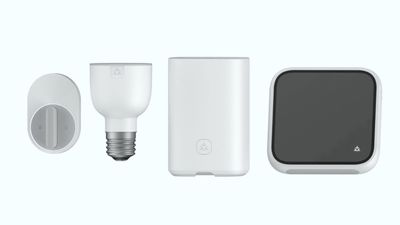The Connectivity Standards Alliance, which includes major tech companies like Apple, Amazon, and Google, today announced the launch of "Matter," a new interoperable, secure connectivity standard designed for smart home devices.

Formerly known as "Project CHIP," Matter is a unified IP-based connectivity protocol that will be used to build and connect Internet of Things ecosystems. It is royalty-free and enables communications between a wide range of smart devices, plus it serves as a seal of approval to ensure that items built on this standard are reliable, secure, and able to work together.
With Matter, consumers and businesses can choose the brands they want in their smart home or commercial building and be confident they will work seamlessly. Homeowners, and especially those living in a smart home with multiple devices like smart locks, thermostats or smart speakers, can easily add new devices with a Matter mark using a simple setup code to connect their home as one. Businesses, particularly those that rely on connectivity, can count on one network to keep their operations running smoothly.
Matter ensures that smart home devices are compatible with smart home and voice services like Amazon Alexa, HomeKit, Google Assistant, SmartThings, and more, with the first specification of Matter running on existing networking technologies like Ethernet, WiFi, Thread, and Bluetooth Low Energy. Matter was designed with several key attributes in mind:
- Simplicity - Easy to purchase and use. Simplifying connected experiences.
- Interoperability - Devices from multiple brands work natively together. Providing greater compatibility.
- Reliability - Consistent and responsive local connectivity.
- Security - Maintaining secure connections. Robust and streamlined for developers and users.
- Flexibility - Matter makes it easy for users to set up and control their devices with multiple ecosystems simultaneously.
The first devices that use Matter could be released in late 2021, and smart home device manufacturers are working on Matter-compatible light bulbs, plugs, outlets, thermostats, door locks, sensors, window coverings, TVs, and more.
Matter early adopters include Amazon, ASSA ABLOY, Comcast, Espressif Systems, Eve Systems, Google, Grundfos Holding A/S, Huawei, Infineon Technologies, LEEDARSON, Legrand, Nanoleaf, Nordic Semiconductor, NXP Semiconductors, Qorvo, Resideo, Schlage, Schneider Electric, Signify, Silicon Labs, SmartThings, Somfy, STMicroelectronics, Texas Instruments, Tuya Smart, ubisys, Wulian, and Zumtobel Group.
























